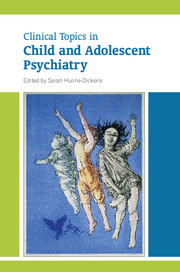Book contents
- Frontmatter
- Contents
- List of tables
- List of boxes
- List of figures
- List of contributors
- Preface
- 1 Child psychiatry and the people who have shaped it
- 2 Fabrication and induction of illness in children
- 3 Personality disorders as disorganisation of attachment and affect regulation
- 4 Post-traumatic stress disorder and attachment: possible links with borderline personality disorder
- 5 Management of antisocial behaviour in childhood
- 6 Pharmacology for attention-deficit hyperactivity disorder, Tourette syndrome and autism spectrum disorder
- 7 Pharmacology for anxiety and obsessive–compulsive disorders, affective disorders and schizophrenia
- 8 Pharmacological management of core and comorbid symptoms in autism spectrum disorder
- 9 Pharmacological treatment of depression and bipolar disorder
- 10 Cognitive–behavioural therapy with children, young people and families: from individual to systemic therapy
- 11 Anxiety disorders
- 12 Somatising: clinical presentations and aetiological factors
- 13 Somatising: management and outcomes
- 14 Evaluating psychological treatments for children with autism
- 15 Attention-deficit hyperactivity disorder: assessment and treatment
- 16 Schizophrenia
- 17 Tourette syndrome
- 18 Sleep disorders
- 19 Self-harm in adolescents
- 20 Adolescent substance misuse: an update on behaviours and treatments
- 21 Eating disorders
- 22 Gender dysphoria in young people
- 23 The psychiatry of children aged 0–4
- Index
6 - Pharmacology for attention-deficit hyperactivity disorder, Tourette syndrome and autism spectrum disorder
Published online by Cambridge University Press: 02 January 2018
- Frontmatter
- Contents
- List of tables
- List of boxes
- List of figures
- List of contributors
- Preface
- 1 Child psychiatry and the people who have shaped it
- 2 Fabrication and induction of illness in children
- 3 Personality disorders as disorganisation of attachment and affect regulation
- 4 Post-traumatic stress disorder and attachment: possible links with borderline personality disorder
- 5 Management of antisocial behaviour in childhood
- 6 Pharmacology for attention-deficit hyperactivity disorder, Tourette syndrome and autism spectrum disorder
- 7 Pharmacology for anxiety and obsessive–compulsive disorders, affective disorders and schizophrenia
- 8 Pharmacological management of core and comorbid symptoms in autism spectrum disorder
- 9 Pharmacological treatment of depression and bipolar disorder
- 10 Cognitive–behavioural therapy with children, young people and families: from individual to systemic therapy
- 11 Anxiety disorders
- 12 Somatising: clinical presentations and aetiological factors
- 13 Somatising: management and outcomes
- 14 Evaluating psychological treatments for children with autism
- 15 Attention-deficit hyperactivity disorder: assessment and treatment
- 16 Schizophrenia
- 17 Tourette syndrome
- 18 Sleep disorders
- 19 Self-harm in adolescents
- 20 Adolescent substance misuse: an update on behaviours and treatments
- 21 Eating disorders
- 22 Gender dysphoria in young people
- 23 The psychiatry of children aged 0–4
- Index
Summary
Historically, paediatric pharmacology in general and paediatric psychopharmacology in particular have received much less research interest and funding than their adult counterparts. As a consequence, relatively few drugs are licensed for use in child and adolescent populations.
One of the greatest obstacles to evidence-based clinical practice is the time taken to translate research findings into treatment recommendations that are effective and usable in a general out-patient setting. Unfortunately, there are also several clear examples of changes in clinical practice outstripping the available evidence. In this chapter and the next, we describe some of the recent advances and current controversies in child and adolescent psychopharmacology. With the exception of attentiondeficit hyperactivity disorder (ADHD) in this chapter, they are organised by disorder rather than drug class. The section on ADHD is organised by class of drug as this best reflects the ways in which clinical decisions are made about individual patients.
Attention-deficit hyperactivity disorder
There has been more research into the use of medication for the treatment of ADHD than any other area of child and adolescent psychopharmacology, and most clinicians are now comfortable with the idea of using medications as a part of their treatment of ADHD. There have, however, been key advances in knowledge and several new treatment options introduced over the past few years. In addition, more basic science studies have helped clarify the relationship between the pharmacokinetics and misuse potential of stimulant medications (Volkow et al, 1995) and raised interesting questions about the relationship between core ADHD symptoms and cognition (Coghill et al, 2007). Clinical studies have started to address the similarities and differences between different medications as well as their effect on non-core aspects of functioning and quality of life (Coghill, 2010). In view of the quantity of trial data and the fact that most clinicians are used to working with these drugs, we focus here on newer medications and current controversies.
Evidence-based treatment and the MTA study
The end of 1999 saw the publication of the primary findings from the Multimodal Treatment of Attention Deficit Hyperactivity Disorder (MTA) multisite study, which was funded by the US National Institute of Mental Health. These findings, and the ensuing commentaries and criticisms of the study, marked a milestone in child and adolescent psychiatry research.
- Type
- Chapter
- Information
- Clinical Topics in Child and Adolescent Psychiatry , pp. 74 - 93Publisher: Royal College of PsychiatristsPrint publication year: 2014



